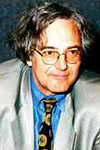
Guest lectures by Claudio Franceschi
Claudio Franceschi, distinguished gerontologist and head of the Interdepartmental Centre “L. Galvani” for the Study of Biocomplexity, University of Bologna, Italy, will be visiting Norway 2 - 5 March 2004. During his stay, which is co-hosted by Prof. Erling Seeberg, Centre for Molecular Biology and Neuroscience, Oslo, and Prof. Stig W. Omholt, CIGENE, Ås, he will give two talks, one in Oslo and one in Ås.
Professor Franceschi is a world leading capacity within Aging Research and has been working with a unique material of centenarians in Italy. He is the Scientific Director of the Italian National Research Centre on Ageing, Ancona, Italy.
Prof. Claudio Franceschi, Interdepartmental Center “L. Galvani” for the study of Biocomplexity , University of Bologna, Italy, will give a guest lecture on Thursday 4 March 2004 at 14:00 in auditorium A3.3067 at Molecular Microbiology, Rikshospitalet, with the title:
Immunology and genetics of ageing and longevity in humans
The ultimate goal of the biomedical research on aging is to improve the health status of elderly people, identifying risk factors for frailty, disability and major age-related diseases. Thus, the research on aging should be focussed on human aging but this type of research has tremendous limitations, owing to the complexity of human lifespan determinants, the interaction between Nature and Culture, and the strong ethical implications. Nevertheless, we will try to show that the study of human aging and longevity can disclose perspectives which have not been predicted by the study of model systems such as C. elegans, D. melanogaster, and M. musculus. To this purpose the results of epidemiological/demographic studies on centenarians (Sardinia, Mantova province) will be illustrated, with particular attention to gender difference and the non-random geographic distribution of centenarians. Important but neglected topics such as quality and quantity of sleep in very old people will be addressed. As far as the biological determinants of longevity are concerned, we will focus on the hypothesis that chronic antigenic load represents one of the major driving force of the rate of aging and of the onset of major age-related diseases, being responsible for INFLAMM-AGEING, i.e. the peculiar chronic inflammatory status, which develops with age in humans and is involved in frailty and sarcopenia. Starting from data on IGF-1 plasma levels and its genetic control in nonagenarians and centenarians we will argue that in old people a trade-off likely exists between maintenance of muscle mass and strength and cancer incidence, suggesting that one of the major finding which emerged from studies in animal models, i.e. the importance for longevity of insulin/IGF-1–signaling pathway, likely has a counterpart in humans. This pathway is involved in glucose and energy utilisation, two metabolic activities in which mitochondria play a central role. We will present data suggesting that a complex interplay between nuclear and mitochondrial genomes occurs, and that germ line mitochondrial DNA variants and mutations likely affect human longevity. Finally, we will discuss the urgency of an integrated approach and the need of innovative theoretical models, encompassing the major environmental and biological variables, which are known to contribute to ageing and longevity, in order to disentangle the complexity of these phenomena in animal models as well as in humans.
Prof. Franceschi will also give a guest lecture on Wednesday 3 March 2004 at 1115-1200 in auditorium U338 in "Urbygningen" at the Agricultural University of Norway at Ås, with the title:
The immune system as a complex system: mathematical models of immunosenescence
The general architecture of the immune system as a complex system involving billions of interacting cells and molecules will be illustrated paying particular attention to the evolutionary moulded interaction between innate and clonotypical immunity. It will be illustrated how a specific immune response to a particular epitope emerges from a structural background characterized by a high degeneracy and promiscuity of receptors and ligands. The hypothesis will be pursued that the changes that the immune system undergoes on a long temporal scale (immunosenescence) allow to understand additional characteristics of the system, and particularly the role that chronic antigenic load and “immunological noise” can play in maintaining immunological memory. Two mathematical models regarding this last topic will be illustrated.

PO Box 1105 Blindern, NO-0317 Oslo, Norway. Tel: +47 22851528. Fax: +47 22851488